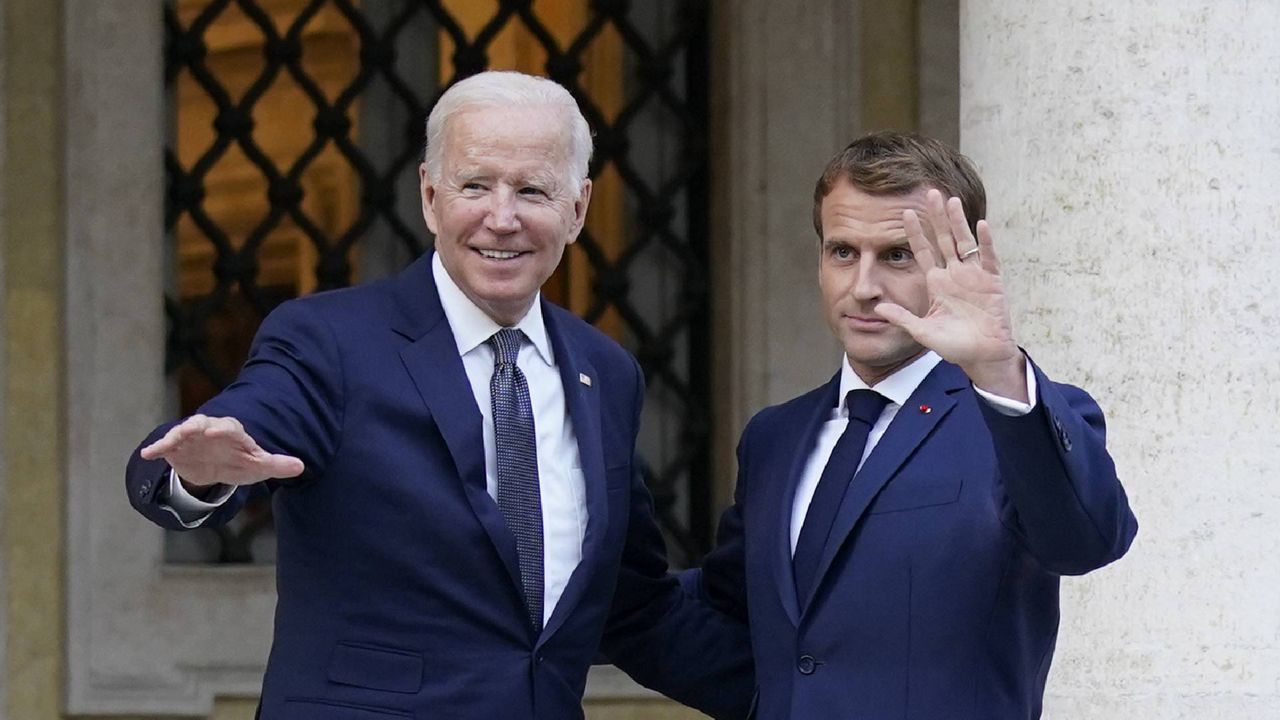In their first face-to-face meeting since a diplomatic tiff over a submarine deal, President Joe Biden and French President Emmanual Macron on Friday addressed the dispute head on, with Biden admitting the U.S. had fumbled the situation and Macron laying out what the two countries will do to continue repairing the relationship.
“What happened was — to use an English phrase — what we did was clumsy. It was not done with a lot of grace,” the president admitted while seated next to Macron at La Villa Bonaparte, the French embassy to the Holy See in Rome.
When the nuclear submarine deal made between the U.S. and Australia was announced last month, French officials were taken by surprise and were angry because it would mean the breakdown of a previous submarine contract they had with Australia.
“I was under the impression that France had been informed long before that the deal was not coming through,” Biden explained, calling the U.S.’ oldest ally an “extremely, extremely valued partner.”
Macron pointed to the repairs made in recent weeks through conversations between the two countries’ officials and to the future objectives of the U.S.-France partnership.
“We clarified together what we had to clarify,” the French president said. “Now what’s important is precisely to be sure that such a situation will not be possible for our future. Stronger coordination, stronger cooperation,” including on “what European defense means.”
“What really matters now is what we will do together in the coming weeks, the coming months, for many years,” he concluded.
The two leaders have also talked twice over the phone and their first face-to-face meeting since the scandal broke in September marks the latest American effort to try to smooth things over.
At a restaurant nearby, the First Lady Jill Biden met with French First Lady Brigitte Macron, where they drank chardonnay and chatted “just like sisters,” Dr. Biden said afterward. Both women are educators, and meetings between spouses are often more intimate and can help build relationships between countries.
Macron is expecting Biden to make a new “commitment” to supporting French anti-terrorist operations in the Sahel region of Africa, according to a top French official. France has been seeking greater intelligence and military cooperation from the U.S. in the Sahel.
Biden and Macron are set to discuss new ways to cooperate in the Indo-Pacific, a move meant to soothe French tempers over being excised from the U.S.-U.K.-Australia partnership that accompanied the submarine deal. Other topics on the agenda include China, Afghanistan, and Iran, particularly in light of the latter nation agreeing to return to the nuclear negotiating table next month.
The U.S.-led submarine contract supplanted a prior French deal to supply Australia with its own submarines. The U.S. argued that the move, which will arm the Pacific ally with higher-quality nuclear-powered boats, will better enable Australia to contain Chinese encroachment in the region.
But the French, who lost out on more than $60 billion from the deal, have argued that the Biden administration at the highest levels misled them about the talks with Australia and even levied criticism that Biden was adopting the tactics of his bombastic predecessor, Donald Trump. France is especially angry over being kept in the dark about a major geopolitical shift, and having its interests in the Indo-Pacific — where France has territories with 2 million people and 7,000 troops — ignored.
The row challenged Biden’s carefully honed image of working to stabilize and strengthen the trans-Atlantic alliance after Trump’s presidency, as France for the first time in some 250 years of diplomatic relations pulled its ambassador to the U.S. in protest.
U.S. officials, from Biden on down, have worked for weeks to try to soothe tensions, though not so much for Biden to visit France himself to try to reset relations with Paris. Instead, he’s dispatched Vice President Kamala Harris for a visit in early November.
In a concession by the White House, the Biden-Macron meeting in Rome is being organized and hosted by France, which Macron’s office called “politically important.” Meanwhile, first lady Jill Biden was to host Brigitte Macron for a “bilateral engagement’ Friday afternoon.
White House officials said Biden has not formally apologized to the French leader, instead, according to press secretary Jen Psaki, “He acknowledged that there could have been greater consultation” ahead of the deal announcement.
U.S. national security adviser Jake Sullivan said the two leaders would “literally cover the waterfront of issues facing the U.S.-France alliance,” including counterterrorism in the Middle East, China and trade and economic issues.
“We feel very good about the intensive engagement that we’ve had with France over the course of the past few weeks,” he added. He said he expected Biden and Macron to issue a joint statement outlining areas of mutual cooperation, including the Indo-Pacific and economic and technological cooperation.
While the U.S. focuses on Asia, Macron is seeking to bolster Europe’s own defense capabilities, such as via more military equipment and military operations abroad.
France is also determined to put “muscle” into Europe’s geopolitical strategy toward an increasingly assertive China, France’s ambassador to Australia, Jean-Pierre Thebault, told The Associated Press earlier this month.
France wants Western allies to “divide up roles” instead of competing against each other, and for the Americans to be “allies as loyal and as available for their European partners as always,” according to the top French official.
The Associated Press contributed to this report.



